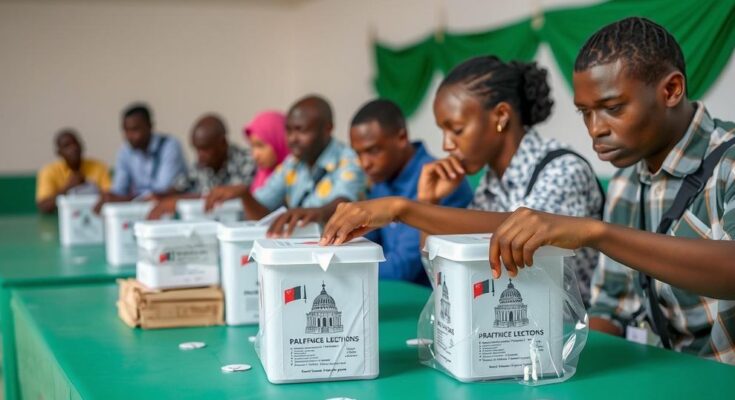Comoros voters head to the polls to elect a new parliament, amidst allegations of irregularities in the previous election which saw President Assoumani reelected. Approximately 338,000 voters are participating as nearly 100 candidates compete for seats, while some opposition parties call for a boycott. The outcome may affect the political future of the island nation, given concerns about the President’s potential nepotism.
On Sunday, voters in Comoros are participating in parliamentary elections for the 33-seat assembly, following the controversial reelection of President Azali Assoumani last year, wherein the opposition alleged significant irregularities. The ruling party has refuted these claims. Polling stations opened at 8 a.m. local time for the approximately 338,000 registered voters, marking the first parliamentary elections since January 2020. Nearly 100 candidates, selected by the Supreme Court, are vying for seats in the parliament.
Critics of President Assoumani characterize him as authoritarian and speculate he is grooming his son, Nour El-Fath, for succession upon the conclusion of his term in 2029. Assoumani has been leading Comoros since a coup in 1999 and has subsequently secured three electoral victories. Notably, he recently granted substantial authority to his son, giving him oversight over all government functions.
While some opposition factions, such as Juwa, led by former President Ahmed Abdallah Sambi—who is currently serving a life sentence—are advocating for a boycott of the elections, other parties have opted to proceed with participation. “The Azali regime is weakened … by participating in these elections we are contributing to further exposing the flaws in its system and accelerating its inevitable fall,” stated Hamidou Karihila, a contender from the opposition Hope of the Comoros party. Polls are scheduled to close at 4 p.m., with results anticipated by January 17.
The Indian Ocean archipelago of Comoros, home to a politically charged atmosphere, is witnessing a significant electoral event with the parliamentary elections set to shape its political landscape. President Azali Assoumani, who has been in power since his coup in 1999, faces criticism from opposition factions regarding the legitimacy of his rule and recent elections. The reestablishment of parliamentary elections after three years is essential amid allegations of authoritarianism, corruption, and familial power consolidation. The dynamic nature of regional politics, influenced by both local and international factors, underscores the critical implications of this electoral round for the future governance of Comoros.
In summary, the parliamentary elections in Comoros represent a pivotal moment in the nation’s political history, amid ongoing tensions surrounding President Azali Assoumani’s governance. With various opposition groups expressing divergent strategies towards participation, the stakes are high. The outcome of this election, expected by mid-January, will likely have profound implications for the future of democracy and governance in Comoros, particularly given the concerns of potential nepotism and authoritarian rule.
Original Source: www.voanews.com




